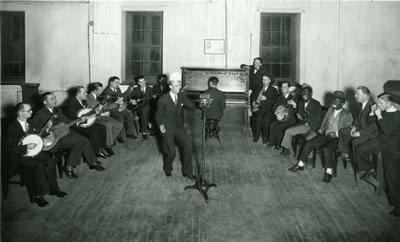|
|
OVER THE AIRWAVES The emergence
of commercial radio in the 1920s played a major role in the expansion
of popular and traditional music across America. With the advent of
radio, local artists were heard across the country. In Virginia, WDBJ
in Roanoke and WRVA in Richmond aired many roots music performers. The
ability to be heard on radio also influenced the scouting by record
companies. OKeh Records chose most, if not all, of the musicians for
the Richmond 1929 session before the event in part because they were
already known to company officials through radio.
Early broadcasts on Richmond radio station WRVA, founded in 1925 by
the Larus and Brother Tobacco Company, featured such local performers
as fiddler Babe Spangler, the Dixie Spiritual Singers, and the Tubize
Royal Hawaiian Orchestra. By the 1930s, the station's main traditional
music show was the Corn Cob Pipe Club. The show owed as much to
vaudeville as to traditional Virginia culture, incorporating an
orchestrated patter of jokes, popular and traditional songs, and even
a minstrel duo patterned after the nationally renowned show Amos and
Andy, which also aired over WRVA.

WRVA's Corn Cob Pipe Club show mixed traditional
music and vaudeville routines, including blackface minstrelsy.
ca. 1930s, Library of Virginia.
|